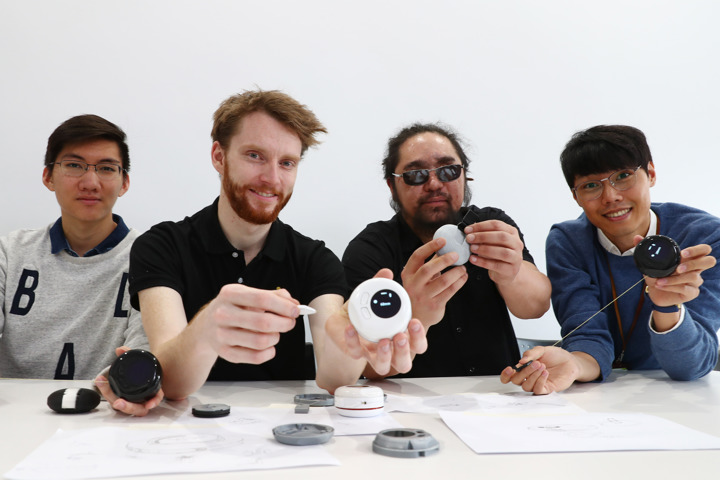Designed and created by four Queensland University of Technology students Jake Dean, Yuma Decaux, Woo Sung Jung and Weng Hou Chan, the team of four will win £2,000 for their design project.
Their inspiration came from a member of the team who is blind and unable to renovate his house due to experiencing difficulties seeing the markings on a tape measure. The device is able to take measurement without needing to read the markings, but also connects via Bluetooth to a mobile device. The app can be used to pre-set the object and distances to be measured. Voice input is also available for the setup and all can be saved to the phone app with the press of a button.
The team hopes that one day the universal design of Macaron will benefit everyone with some form of disability, not just the blind.
Jake Dean from the Macaron team comments,
“People with little to no vision need to rely heavily on specialised measuring devices, but we hope that the Macaron will become the common and everyday household product that leads to a new way of measuring, recording and thinking. Our team is so excited to be recognised for this year’s James Dyson Award and can’t wait to see what the future holds for the device.”
This year, the three Australian judges, Tech Editor Trevor Long, Code Like a Girl Founder, Ally Watson and QUT professor Sue Keay, reviewed over 25 entries across the country before selecting the coveted title for the Australian winner, followed by two runner ups.
The Macaron design will now progress to the international stage of the James Dyson Award with the hope to commercialise the product and win up to £30,000 along with two Australian runners-up including H2 Snow (Tim Lutton from RMIT University) and Indra Mosquito Zapper (Paul Eterovich from Swinburne University of Technology.
- H2 Snow is the world’s first alpine survival tool that converts snow into drinking water by human power. Inspiration to create the product came from designer Paul Eterovich, whose friend was stranded for two days in the snow without water. Snow shouldn’t be consumed without melting itfirst because it can causedehydration and hypothermia. The H2 Snow is a one litre drink bottle whichmelts snow by creating heat through friction and pulverising the snow through a spinning blade.
- The Indra Mosquita Zapper is an insect control device made from recycled materials. Inspiration for the design came from Misquito borne diseases, which are a major public health problem in India, particularlyto street vendors. Powered by renewable energy such as wind and solar, the device creates electricity to zapp and kill mosquitoes. Once fully charged, the stored electricity also creates light and via its USB port, power for a number of everyday uses.



Share this page on